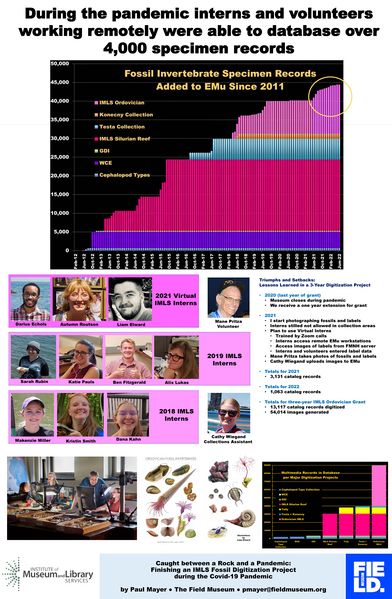File:Mayer Paul pandemic.jpg

| Author | Affiliation |
|---|---|
| Paul Mayer | The Field Museum |
Abstract: The Field Museum in partnership with the Milwaukee Public Museum are finishing a three year IMLS grant to digitize our Ordovician fossil invertebrate collection. The project started in 2018 and was originally scheduled to end in 2020 with groups of interns photographing specimens and entering data from handwritten labels into our digital collections management system for each of the three summers. Due to the Covid-19 Pandemic the museum was shut down and access to the collection was restricted for staff and all onsite internships were canceled. We applied and received a one-year extension from IMLS for 2020, but could not get a full second year extension in 2021 due to their funding cycles. This meant we had to complete the project with no onsite interns. For the last summer session, we needed to digitize approximately 3,100 bryozoans, 1,000 bivalves, 500 graptolites, 500 sponges, 300 tabulate corals, 100 stromatoporoids, and a few miscellaneous specimens. The Field Museum opened up slowly to staff during the pandemic. Initially staff were allowed into the collections just one day a week. The plan I developed was to photograph as many specimens and their labels as possible while at the museum. Normally interns would photograph specimens using a copy stand in our digitization lab, but this would be too slow. Instead I photographed the specimens in the collection area, hand holding the camera and in order to get a good depth of field used a moderate F-stop while setting the ISO to automatic on the camera. The resulting jpg images were better than expected and perfectly acceptable for the project. As I photographed the specimens they were placed on our server. For the summer of 2021 two ‘virtual’ interns were hired to remotely access the label files and using their own computers at home they accessed remote desktops at the museum to enter the label data into our EMu database. We trained the interns and answered questions using Zoom. Currently we have finished digitizing the bivalves, sponges, corals, and stromatoporoids and are nearly finished with the bryozoans, leaving the only graptolites to finish in February.
File history
Click on a date/time to view the file as it appeared at that time.
| Date/Time | Thumbnail | Dimensions | User | Comment | |
|---|---|---|---|---|---|
| current | 18:02, 18 May 2023 |  | 7,200 × 11,000 (3.76 MB) | EmilyBraker (Talk | contribs) | {| class="wikitable" |+ SPNHC 2022 Edinburgh Poster: '''Caught between a Rock and a Pandemic: Finishing an Institute of Museum and Library Services (IMLS) Fossil Digitization Project during the Covid-19 Pandemic''' ! Author ! Affiliation |- ! Paul Ma... |
- You cannot overwrite this file.
File usage
The following page links to this file: